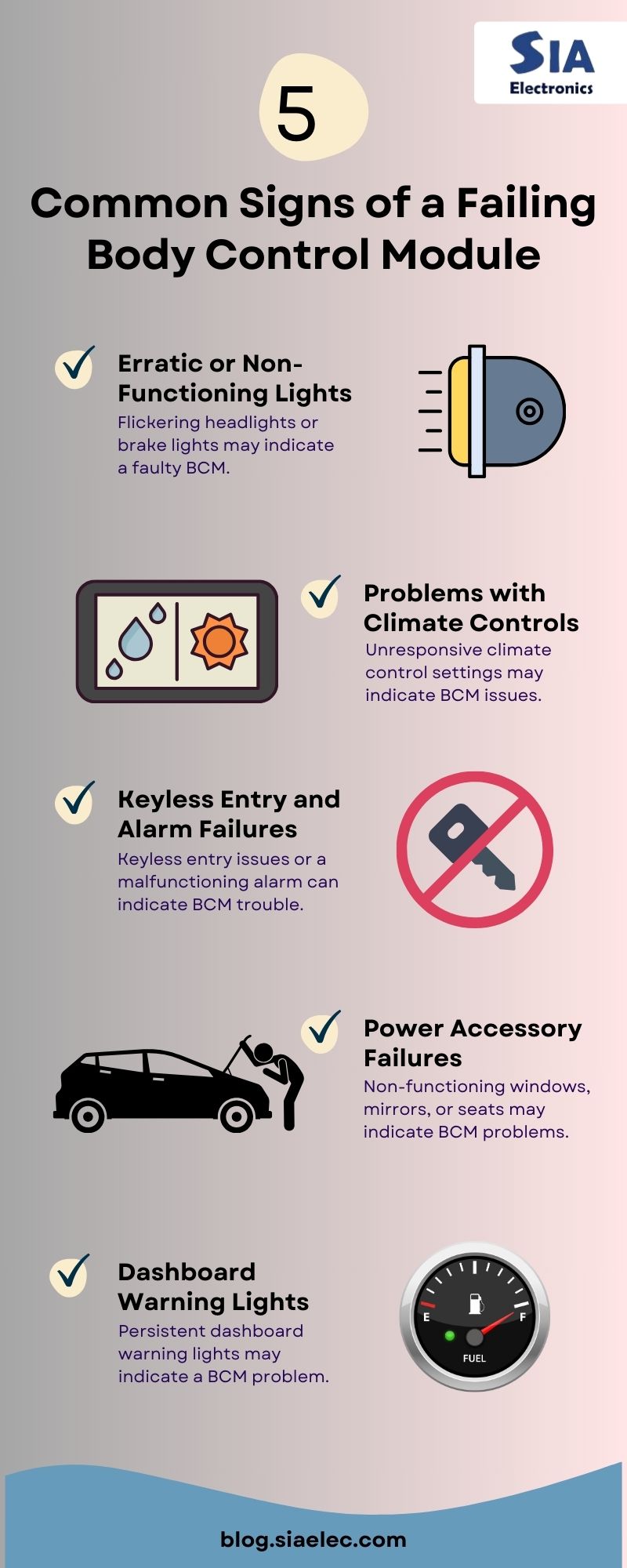Introduction
The Body Control Module (BCM) plays a crucial role in modern vehicles, managing various electrical functions and systems. From controlling lights to regulating climate controls, this central unit ensures your vehicle's electronic systems work in harmony. But what happens when the BCM goes bad? Understanding the causes and signs of Body Control Module failure can help you address issues before they escalate, ensuring your vehicle remains reliable and safe. In this blog, we will explore the common reasons for BCM failure, how to spot problems, and whether to repair or replace the module.
Table of Contents
Understanding the Body Control Module (BCM)
The Body Control Module (BCM) is an electronic control unit responsible for managing several essential functions in your vehicle. It serves as a central hub for various electrical systems, including:
- Lighting Systems: Headlights, taillights, and interior lighting.
- Climate Controls: Heating, ventilation, and air conditioning.
- Security Systems: Alarms, keyless entry, and immobilizers.
- Power Accessories: Windows, mirrors, and seats.
Typically located under the dashboard or in the engine bay, the BCM communicates with other modules and sensors to coordinate these functions. As a critical component of your vehicle's electrical system, a malfunctioning BCM can lead to a host of issues.
Common Signs of a Failing Body Control Module
Detecting BCM failure early can save you from more significant repairs. Here are some common signs that your Body Control Module might be going bad:
- Erratic or Non-Functioning Lights: If your headlights, brake lights, or interior lights flicker or stop working intermittently, the BCM might be at fault.
- Problems with Climate Controls: Unresponsive or malfunctioning climate control settings can indicate BCM issues.
- Keyless Entry and Alarm Failures: Difficulty with keyless entry or a malfunctioning alarm system can be a sign of BCM trouble.
- Power Accessory Failures: Windows, mirrors, or seats that don't function correctly may point to BCM problems.
- Dashboard Warning Lights: Unusual or persistent warning lights on your dashboard can indicate a problem with the BCM.
- Electrical Glitches: Random electrical glitches or system resets may be related to BCM issues.
Can a Bad BCM Cause Electrical Issues in My Car?
Yes, a failing Body Control Module can indeed cause a wide range of electrical issues in your vehicle. Since the BCM controls multiple electrical systems, its malfunction can lead to:
- Intermittent Electrical Failures: Systems that rely on the BCM may work sporadically or stop functioning altogether.
- Battery Drain: A faulty BCM can cause continuous power draw, leading to battery drain and starting issues.
- Communication Errors: The BCM’s failure to communicate properly with other modules can disrupt various functions, such as transmission control or ABS systems.
- Inconsistent Sensor Data: Incorrect or inconsistent data from sensors managed by the BCM can lead to performance issues and inaccurate readings.
How to Prevent Your BCM from Going Bad
Preventing BCM failure involves maintaining your vehicle’s electrical system and addressing potential issues early. Here are some tips:
- Regular Maintenance: Ensure that your vehicle undergoes regular electrical system inspections and maintenance.
- Address Electrical Issues Promptly: If you notice any electrical problems, have them checked by a professional to prevent further damage.
- Keep the BCM Area Clean and Dry: Avoid exposing the BCM to moisture or debris, which can cause corrosion or short circuits.
- Use Quality Parts: When replacing components related to the BCM, use high-quality parts to ensure compatibility and reliability.
- Avoid Overloading Circuits: Do not add aftermarket electrical accessories that may overload the BCM’s circuits.
Repair vs. Replacement
When the BCM goes bad, you typically have two options: repair or replacement. Here's a brief overview:
Repair
Pros:
- Often less expensive than replacement.
- May extend the life of the BCM if the issue is minor.
Cons:
- Not always guaranteed to resolve all issues.
- Can be time-consuming and may not address underlying problems.
Replacement
Pros:
- Provides a new or re-manufactured BCM, often with a warranty.
- Ensures compatibility and reliability with current vehicle systems.
Cons:
- More expensive than repair.
- Requires programming to match your vehicle’s specifications.
For a reliable solution, consider services like SIA Electronics, which specializes in re-manufacturing automotive electronic control modules and ECUs. With over 20 years of experience, SIA Electronics provides high-quality repairs and replacements for BCMs and other critical components.
Conclusion
Understanding the causes of Body Control Module (BCM) failure and recognizing its symptoms can help you maintain your vehicle's electrical system effectively. By being aware of the signs, preventive measures, and your options for repair or replacement, you can make informed decisions and ensure your vehicle remains reliable and safe. For expert BCM services, consider SIA Electronics, an industry leader with over 20 years of experience in re-manufacturing automotive electronic control modules and ECUs.
FAQs on
What Causes a Body Control Module to Go Bad? Common Issues and Solutions
-
1. What causes a Body Control Module to fail?
Ans.
Common causes include exposure to moisture, electrical surges, physical damage, and manufacturing defects.
-
2. How can I tell if my BCM needs repair or replacement?
Ans.
Symptoms such as erratic electrical functions, warning lights, and persistent issues despite repairs may indicate a need for replacement.
-
3. Can I drive my car if the BCM is failing?
Ans.
While you may be able to drive, a failing BCM can cause unreliable vehicle functions. It’s best to address the issue promptly to avoid further complications.
-
4. How much does it cost to repair or replace a BCM?
Ans.
Repair costs can range from $200 to $500, while replacement costs may vary from $500 to $1,500, depending on the vehicle and BCM model.
-
5. Is it possible to diagnose BCM issues myself?
Ans.
While some symptoms are noticeable, accurate diagnosis typically requires specialized equipment and expertise. It’s recommended to consult a professional.
-
6. How long does a BCM repair or replacement take?
Ans.
The process can take anywhere from a few hours to a few days, depending on the complexity of the repair or the availability of replacement parts.



